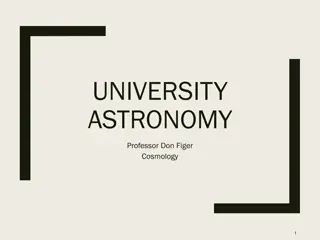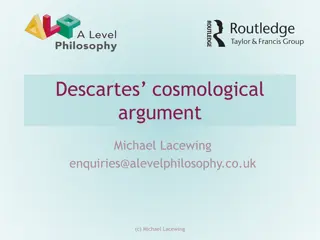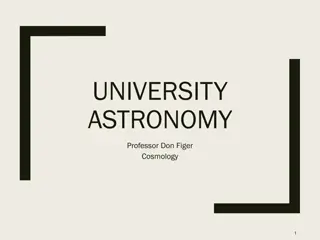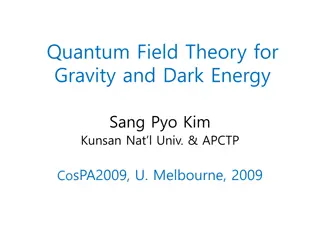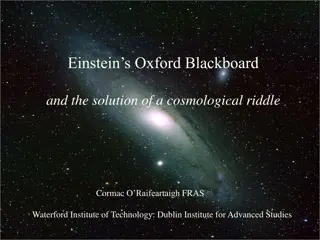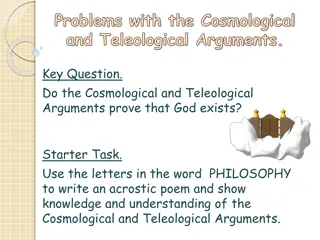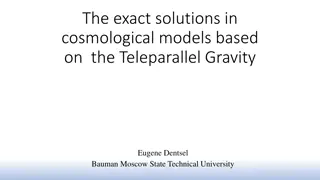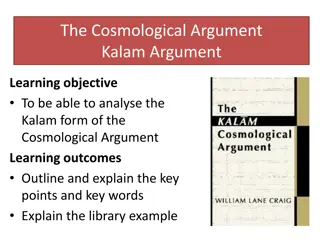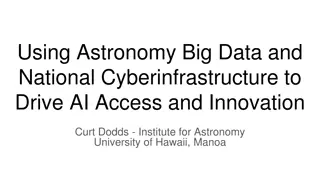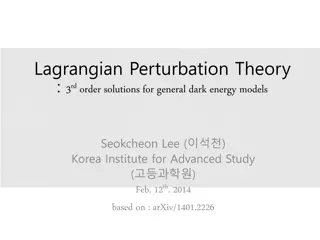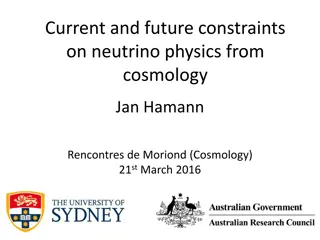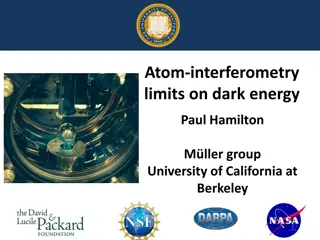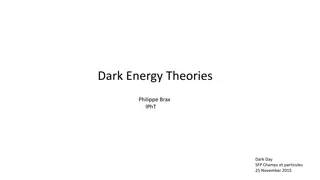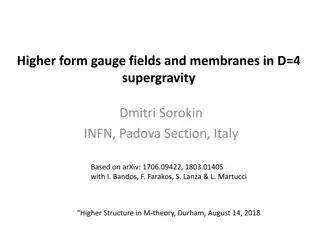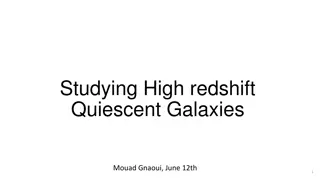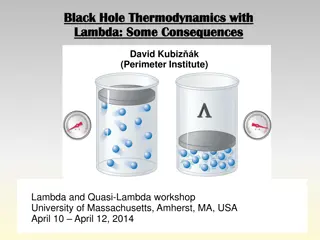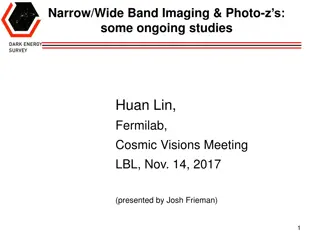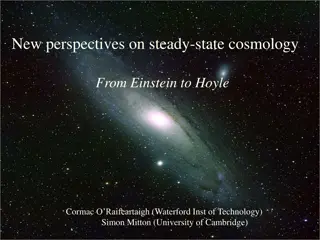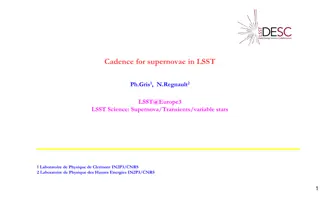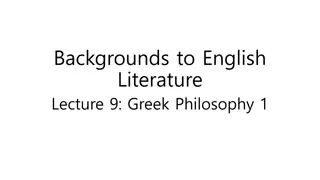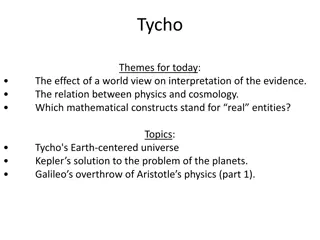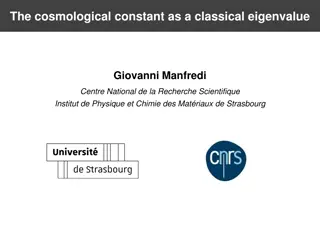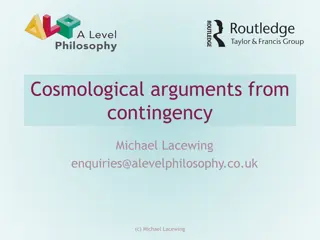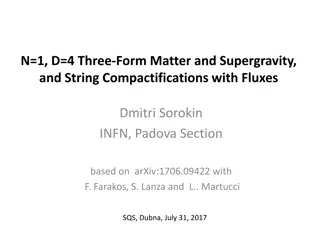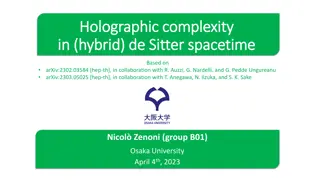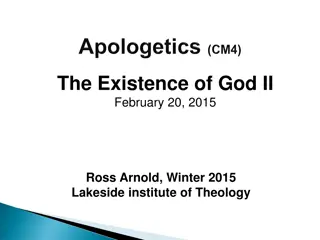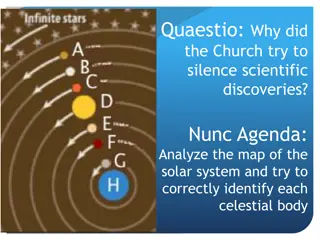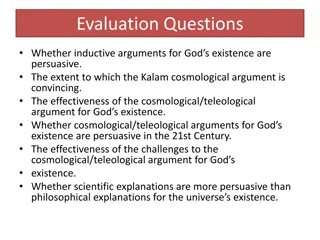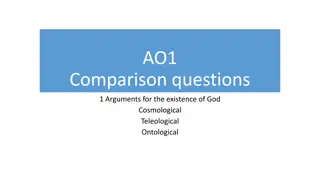UNIVERSITY ASTRONOMY
Delve into the fascinating realm of cosmology as we unravel the mysteries of the Universe, from its origins with the Big Bang theory to the accelerating expansion and potential fate of the cosmos. Discover the history of cosmological thought, from Aristotle to Newton, and ponder profound questions a
0 views • 50 slides
Descartes' Cosmological Argument and Existence Inquiry
Descartes presents a cosmological argument questioning the existence of anything, focusing on what causes his own existence. He explores different aspects such as perfection, dependency, and the idea of God as a necessary cause for existence. Challenges about the nature of continued existence are al
0 views • 17 slides
Exploring Cosmology: A Journey Through the Universe's Mysteries
Delve into the fascinating field of cosmology with Professor Don Figer as he unravels the big bang theory, cosmological observations, and ponders the fate of the Universe. Learn about the origins of cosmology, its elements, history from Aristotle to Newton, and the evolution of our understanding of
0 views • 56 slides
Exploring Quantum Field Theory for Gravity and Dark Energy
Delve into the fascinating realms of quantum field theory as applied to gravity and dark energy, unraveling the mysteries of the universe through concepts like vacuum energy, cosmological constants, and dark energy models. Discover the interconnected web of theories concerning the early universe, in
0 views • 27 slides
Einstein's Oxford Blackboard: Unraveling the Cosmos in 1931
Einstein's lectures in Oxford in 1931, focusing on his blackboard model of the cosmos, shed light on anomalies in his previous work and marked a pivotal moment in 20th-century science. This glimpse into Einstein's views of Oxford and his interactions with the academic community gives insight into hi
4 views • 14 slides
Exploring Problems with Cosmological and Teleological Arguments
Dive into the challenges faced by the Cosmological and Teleological Arguments in proving the existence of God. Explore key questions, acrostic poems, lesson outcomes, and activities to deepen your understanding of these philosophical concepts. Discover how scientific theories like the Big Bang Theor
0 views • 6 slides
Observational Constraints on Viable f(R) Gravity Models Analysis
Investigating f(R) gravity models by extending the Einstein-Hilbert action with an arbitrary function f(R). Conditions for viable models include positive gravitational constants, stable cosmological perturbations, asymptotic behavior towards the ΛCDM model, stability of late-time de Sitter point, a
1 views • 12 slides
Exact Solutions in Cosmological Models Based on Teleparallel Gravity
Precision in cosmological models based on teleparallel gravity is explored, including fundamental theories, modifications, and applications in the context of General Relativity. The construction principles of GR modifications, characteristic tensors, relation between different metric-affine geometri
0 views • 17 slides
Understanding the Kalam Argument in the Cosmological Debate
The Kalam Argument, a form of the Cosmological Argument, asserts that everything with existence has a cause, including the universe. Developed by thinkers like al-Kindi, al-Ghazali, and William Lane Craig, it aims to prove that God was the initial cause of the universe. This argument suggests that t
0 views • 17 slides
Exploring Astronomy Big Data and Cyberinfrastructure for AI Innovation
Harnessing the power of big data in astronomy, this presentation by Curt Dodds from the Institute for Astronomy at the University of Hawaii, Manoa, delves into the utilization of national cyberinfrastructure to advance artificial intelligence access and foster innovation in the field. The discussion
0 views • 40 slides
Lagrangian Perturbation Theory: Applications in Cosmology
Lagrangian Perturbation Theory (LPT) offers solutions for general dark energy models and is crucial for upcoming large-scale surveys. It provides a method to displace particles at large scales efficiently. While Standard Perturbation Theory (SPT) is limited at linear order, LPT overcomes its drawbac
0 views • 14 slides
Neutrino Mysteries Unveiled: Current Cosmological Constraints
Delve into the enigmatic world of neutrinos with a focus on their elusive properties like mass hierarchy, additional light neutrinos, and impact on cosmic background. Explore the unresolved questions surrounding neutrino physics from cosmological perspectives.
0 views • 29 slides
Limits on Dark Energy Using Atom Interferometry - UC Berkeley Study
Research conducted by Paul Hamilton Müller's group at the University of California, Berkeley, focuses on using atom interferometry to explore dark energy. The study delves into screened scalar fields as dark energy, future reach with atom interferometry, known unknowns related to dark energy densit
0 views • 39 slides
Understanding Dark Energy Theories and Cosmological Dynamics
Exploring the concept of dark energy and its implications in the acceleration of the Universe. Various theories, including cosmological constants, vacuum energy, and modifications of General Relativity, are discussed. The role of vacuum fluctuations, gravitational coupling, and the challenges in des
4 views • 29 slides
Higher-Form Gauge Fields and Membranes in D=4 Supergravity
This study focuses on higher-form gauge fields and membranes in D=4 supergravity, exploring their role in cosmological constant generation and membrane nucleation. The dynamics of three-form gauge fields, their coupling to gravity and membranes, and implications for cosmological models and supersymm
0 views • 17 slides
Exploring High Redshift Quiescent Galaxies with NIR Studies
Introduction to the fascinating world of high redshift quiescent galaxies, focusing on the importance of studying cosmological distances, photometry probes, and the challenges of identifying NIR-dark galaxies. The research delves into SED fitting parameters and the use of ALMA for spectral energy di
0 views • 8 slides
Exploring Black Hole Thermodynamics and Lambda Effects: Insights and Consequences
Delve into the complex interplay between black hole thermodynamics and the cosmological constant Lambda, uncovering intriguing implications and theoretical challenges. Dive deep into the thermodynamic properties of black holes, the role of pressure and volume, and the intriguing parallels to everyda
0 views • 29 slides
Ongoing Studies on Narrow/Wide Band Imaging and Photo-zs
Ongoing studies presented at the Cosmic Visions Meeting focus on the need for precise sample redshift distributions for cosmological inference in imaging surveys. Various photo-z samples and results are discussed, highlighting the importance of deep, multi-band imaging for accurate photo-z estimates
0 views • 12 slides
Revisiting Steady-State Cosmology: From Einstein to Hoyle
Explore the historical evolution of cosmological models from Einstein's steady-state theory to the Big Bang hypothesis, examining key figures, discoveries such as Hubble's law, and debates about the universe's expansion. The article delves into Einstein's contributions, the challenges of integrating
0 views • 18 slides
Cadence for Supernovae in LSST and Dark Energy Hubble Diagrams
This content discusses the cadence for supernovae observations in the Large Synoptic Survey Telescope (LSST) and presents Hubble diagrams related to Supernovae and Dark Energy research. The images and descriptions focus on cosmological aspects, distance moduli, observational strategies, and constrai
0 views • 21 slides
Greek Philosophy: Origins and Influential Thinkers
Greek philosophy originated with the Pre-Socratics in the Ionian School around 600 BC, focusing on naturalistic explanations and cosmological theories. Thales, Anaximander, and Anaximenes were key figures, each proposing unique elemental theories. Pythagoras emphasized the mathematical nature of the
0 views • 19 slides
The Evolution of Cosmological Models: Tycho vs. Copernicus
Explore the historical debate between Tycho Brahe's Earth-centered universe and Copernicus's heliocentric model, focusing on the impact of worldviews on interpreting evidence, the relationship between physics and cosmology, and the role of mathematical constructs in representing real entities. Disco
0 views • 19 slides
Exploring the Cosmological Constant as a Classical Eigenvalue
The concept of the cosmological constant, its implications in the standard cosmological model, and its relation to dark energy are discussed in this scientific exploration. The discussion delves into whether the cosmological constant is truly constant or varies in space and time, and its role in gra
0 views • 10 slides
The Origin and Evolution of the Universe
Debate in medieval philosophy over the universe's past, Kepler's finite universe theory, Newton's motion principles, and Poe's "Primordial Particle" concept. The Big Bang theory by Georges Lemaître and Edwin Hubble, with Friedmann's dynamic cosmological model. Also covers the Steady State theory an
0 views • 9 slides
Cosmological Arguments from Contingency Explained
Explore the concept of necessary and contingent existence, Aquinas' Third Way argument for the existence of God, objections to the causal principle, and the idea of a series of contingent things. Contemplate the question of why anything exists and whether God provides the answer.
0 views • 16 slides
Three-Form Matter and Supergravity in String Compactifications
Investigating the role of 3-form gauge fields in N=1, D=4 supergravity and matter supermultiplets, exploring their connection to cosmological constant, neutralization mechanisms, and susy breaking. The duality between 3-form fields and cosmological constant is discussed, along with a novel supersymm
0 views • 13 slides
Holographic Complexity in Hybrid De Sitter Spacetime
The research delves into holographic complexity in a hybrid de Sitter spacetime, exploring the AdS/CFT correspondence, quantum information in the bulk, and computational complexity. It also examines the volume of the ERB, evolution of complexity in CFT, and probes cosmological horizons using hologra
0 views • 12 slides
Philosophical Apologetics: Arguments for the Existence of God
Philosophical apologetics presents various arguments for the existence of God, including the ontological, cosmological, teleological, moral, transcendental, and presuppositional arguments. These arguments cover diverse aspects such as change, causality, design, contingency, miracles, consciousness,
0 views • 10 slides
Evolution of the Heliocentric Model: Science vs. Church
The Church historically backed the Geocentric Model, placing Earth at the center of the universe based on biblical interpretations. However, trailblazing astronomers like Copernicus, Brahe, and Kepler challenged this notion by proposing the Heliocentric Model with the Sun at the center. This shift l
0 views • 18 slides
Evaluating Arguments for God's Existence in the 21st Century
Exploring the persuasiveness of inductive arguments for God's existence, assessing the Kalam cosmological argument, and evaluating the effectiveness of cosmological/teleological arguments. Delving into whether scientific explanations surpass philosophical ones, the strengths and weaknesses of these
0 views • 16 slides
Comparison of Arguments for the Existence of God
The comparison explores the Cosmological, Teleological, and Ontological arguments for the existence of God. It delves into the similarities and differences between key proponents such as Aquinas, Paley, William Lane Craig, and Tennant. Each argument is examined based on its form, empirical evidence,
0 views • 10 slides
